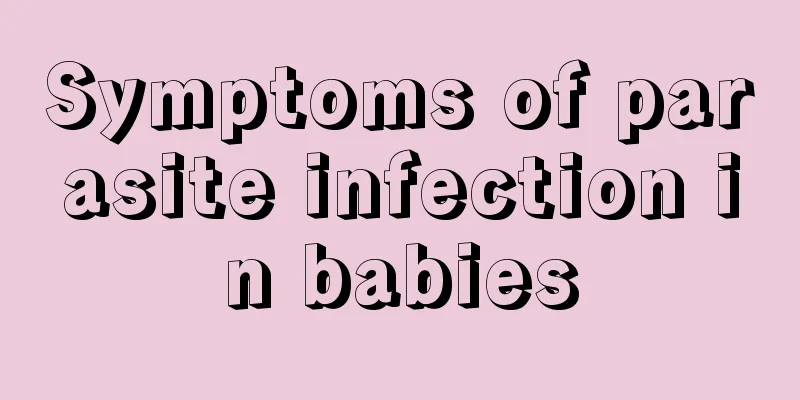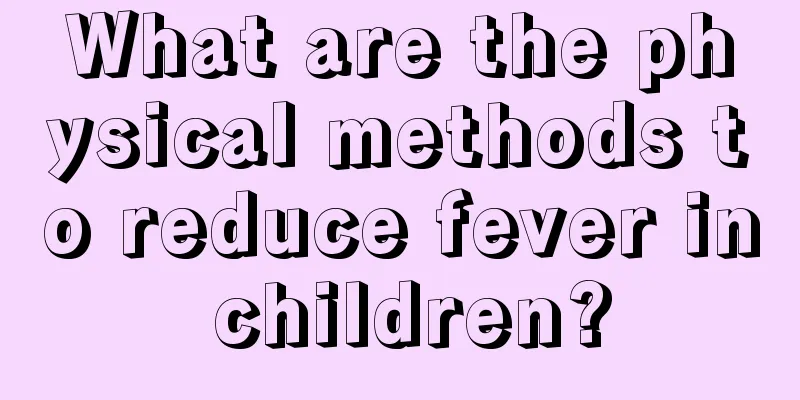Symptoms of parasite infection in babies

|
It is very common for babies to have parasites in life. Once parasitic infection occurs, it will have a great impact on the baby's health. There are many types of parasites, such as roundworms, pinworms, hookworms, etc. Generally speaking, they will cause the child to become thin and malnourished, and their physical fitness will decline. If they enter the tissues and organs, they will cause greater harm. Let's take a look at the symptoms of parasitic infection in babies. Symptoms of parasite infection in babies 1. Ascariasis (1) Symptoms caused by larval migration: Ascaris eggs migrate to the lungs, causing bronchiolar epithelial cells to fall off and lung bleeding, resulting in pulmonary ascariasis, which is manifested by cough, chest tightness, blood-streaked sputum, and increased eosinophilia in the blood. Pulmonary signs are not obvious, but X-rays may show punctate, flaky, or flocculent shadows in the lungs. The lesions are prone to change or disappear quickly. This is called ascariasis larvae pneumonia or ascariasis eosinophilic pneumonia, or LOEFFLER syndrome. Symptoms disappear in 1-2 weeks. In severe cases, the larvae can invade the brain, liver, spleen, kidneys, thyroid gland and eyes, causing corresponding clinical manifestations such as epilepsy, hepatomegaly, abdominal pain, etc. (2) Symptoms caused by adult worms: Adult worms live in the jejunum and feed on semi-digested food in the intestinal cavity. The clinical manifestations include loss of appetite or eating more and getting hungry easily, pica; frequent abdominal pain located around the navel, which is relieved by massage but not severe; some patients are irritable, easily startled or listless, and grind their teeth; the foreign proteins in the worm can cause allergic symptoms such as urticaria. Severe infection can cause malnutrition and affect growth and development. (3) Complications: Ascaris has the habit of drilling holes. When the human body is unwell (fever, gastrointestinal lesions, etc.) or when a large amount of spicy food is ingested or the dosage of anthelmintics is inappropriate, the ascaris will drill into various ducts opening in the intestinal wall. This can not only cause biliary ascariasis and ascariasis ileus, but also block the trachea and bronchi, causing death from suffocation. It may also drill into the appendix or pancreatic duct, causing inflammation. 2. Enterobiasis Pinworm infection can cause local and systemic symptoms. The most common symptoms are anal itching and eye restlessness, because the egg-laying activities of female worms cause intense itching of the anal and perineal skin, affecting sleep. Local skin may develop dermatitis and secondary infection due to pruritus. Systemic symptoms include gastrointestinal irritation, such as nausea, vomiting, abdominal pain, diarrhea, loss of appetite, as well as restlessness, night terrors, irritability and other mental symptoms. An increase in eosinophils was seen in peripheral blood. 3. Hookworm disease (1) Hook larvae dermatitis: Hook larvae invade the skin in thin areas between toes or fingers and other exposed skin. Red palladium dot-like papules or small blisters may reappear, with a burning, tingling, and itchy sensation that disappears within a few days. Scratching often leads to secondary infection, forming pustules, and can cause fever and lymphadenitis. (2) Respiratory symptoms: In acute hookworm infection, the larvae migrate to the lungs, penetrate the microvessels, and cause inflammatory cell infiltration and bleeding. Clinically, symptoms include cough, bloody sputum, fever, shortness of breath, and asthma. The sputum may contain blood and even severe hemoptysis. Chest X-ray examination showed transient infiltrative lesions in the lungs and increased blood phagocytosis. The course of the disease may be days or weeks. (3) Anemia: Anemia is the main symptom of hemorrhagic anemia. It manifests as varying degrees of anemia, pale skin and mucous membranes, fatigue, and dizziness, which affect the physical and intellectual development of children. In severe cases, anemic heart disease may occur. (4) Gastrointestinal symptoms: Initial symptoms include bulimia, eating more and becoming hungry easily, but also weight loss. In the later stage, there will be decreased appetite, gastrointestinal dysfunction, abdominal distension, pica, malnutrition, etc. In severe cases, bloody stools may occur. Regardless of the type of parasitic disease, we should focus on prevention, mainly by cultivating good hygiene habits in children, washing hands before meals and after defecation, correcting the habit of sucking fingers, cutting nails frequently, wearing full-crotch pants for infants and young children as early as possible, and washing and disinfecting toys, utensils, and bedding regularly. Children under two years old should be prevented from picking up dirty objects and putting them in their mouths. Then, it is best for children over three years old to have a parasite check every year for better prevention and treatment. |
<<: What are the symptoms of baby fever
>>: Symptoms of colic in infants and young children
Recommend
Why do children's teeth turn yellow?
During the growth process of every child, parents...
How to prevent baby from having fever and convulsions
Many parents are at a loss as to what to do when ...
What's wrong with the newborn baby having small red spots all over his body?
Newborns have incomplete body functions and their...
Causes and treatment of scleredema in children
Newborn babies are weak and have insufficient res...
Do babies need to take a bath every day?
In the eyes of many people, they believe that chi...
Symptoms of onychomycosis in children
If a child has onychomycosis, parents must take t...
What causes dry retching in newborns?
What causes dry retching in newborns? I believe t...
What kind of nutritious breakfast should children eat?
Childhood is a period of rapid growth and develop...
What to eat for dry eyes in children
We all know that if adults overuse their eyes and...
Why does the child's hair stand up?
Many parents will find that their children's ...
How much water is appropriate for babies to drink?
Today I will show you how much water is most appr...
White fingernails on children
Our nails are the only cartilage in the body that...
There are three most likely ways to transmit hand, foot and mouth disease!
Hand, foot and mouth disease is caused by the spr...
What is the reason for baby’s red and swollen eyelids?
The eyes are a very sensitive area. If you find t...
11 months old baby milk powder
Baby's milk powder is formulated with differe...









